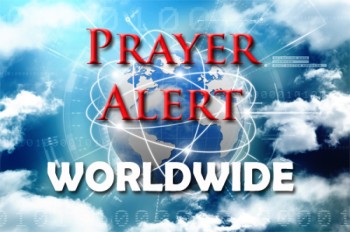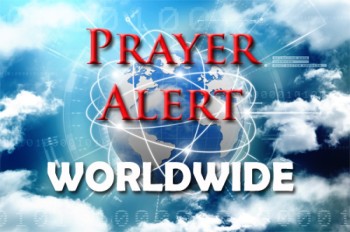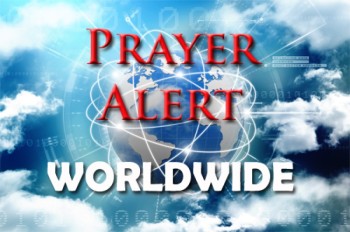Displaying items by tag: Asia
Israel: government budget and society prayers
With the budget passed, the coalition has much to focus on apart from judicial reform. Pray for God’s priorities to be the government’s priorities, and ask God to show the various ministers how to work in unity as they deal with issues. Ask God to place the coalition's reins firmly in prime minister Netanyahu’s hands, and use his partners to keep him turning Israel onto a more biblical path, while removing any ungodly advisers from him. Ask God to anoint finance minister Smotrich to win the war against Israel's high cost of living and show every ministry how to reduce wasteful spending and increase the effectiveness of their budgets. May national security minister Ben-Gvir use the budget dedicated to reinforce and encourage Israel's police force to do just that - while also removing all unrighteousness from its ranks. And finally, ask God to help the housing industry to make affordable housing readily available. See
India: worst anti-Christian violence ever seen
The ongoing attacks on Manipur’s Christians are labelled 'religious cleansing'. Over 317 churches, 70 church schools, 6,137 Christian homes and Christian administrative buildings had been destroyed by 3 May, according to an assessment by the Federation of Indian American Christian Organisations (FIACONA). Other groups estimated 45,000 people have been displaced in what FIACONA is calling ‘the worst anti-Christian violence India has ever seen’. The BJP government used a decades-old underlying ethnic tension between two ethnic groups to create the deadliest violence against Christians, instigated by Hindutva nationalists. It is ‘target killings by government forces’. Events in Manipur follow worsening conditions for Christians across India. Kerala’s Catholic bishops’ council conducted prayers and a candle-lit procession on 6 June, demanding peace should be established in Manipur immediately. Bishops, priests, and laity participated in the meeting and procession.
India: Over 300 killed in triple train crash
Faulty electronic signalling caused India’s worst train crash in two decades, killing over 300 people and injuring 1,100, many seriously. It happened when a passenger train hit a stationary freight train and another passenger train. The trains were carrying 2,296 people. A hundred unidentified bodies, still in mortuaries without refrigeration, are being embalmed. See The railway ministry wants India’s top detective agency, the Central Bureau of Investigation (CBI), to investigate the crash: it usually investigates high profile criminal causes such as serious financial fraud and murder. The railway minister said the root cause of the accident and people responsible for a ‘criminal act’ were identified. Pray for those still searching for their loved ones and those mourning the dead. Pray for healing of emotional and physical wounds. The government wants the British colonial-era railroad network modernised, but despite efforts to improve safety, several hundred accidents occur every year.
India: Fears of civil war in Manipur
Christian and other minority faith group persecution in Manipur worsens. By 26th May 70+ Christians were killed, 10,000 forced from homes, 300+ churches burned or demolished, and 1,000 Christian homes destroyed as Hindus sought Christians to kill or convert to Hinduism. The Supreme Court ordered the military to maintain peace in the region, but the Hindu nationalist government has done nothing to stop the violence. Open Doors said, ‘If the situation continues civil war is inevitable, with more lives lost, properties destroyed and further open persecution of religious minorities.’ Those who have fled don't have food or shelter and face threats of physical violence. Justin Welby is distressed to hear about these attacks on indigenous tribal Christians, saying, ‘Kailean Khongsai is training for Church ordination and is from Manipur. I join him in praying that regional authorities would protect all minority groups, including Christians and their places of worship, and that justice and peace would prevail.’ See
Libya: Christians arrested for apostasy
Libya’s religion is Islam with Sharia law, but the constitution guarantees non-Muslims freedom to practise their religion. Yet, six Libyan Christians, arrested separately, are facing a potential death sentence as apostates for converting from Islam. They are also accused of proselytising others and are charged under Article 207 of the penal code, stipulating the death penalty for promoting views that ‘alter fundamental constitutional principles or structures of the social order’ or overthrow the state. Possessing books, leaflets, drawings, slogans, or anything supporting such a cause is punishable by life imprisonment. Libya’s Internal Security Agency said it issued the arrests to ‘stop an organised gang action aiming to solicit and make people leave Islam’. One of the six Christians is a 22-year-old woman who released a video explaining her conversion to Christianity at the age of 15.
Palestine: Mission mindset of the Church
2% of Palestinians are Christian, outnumbered and persecuted by their Muslim neighbours, facing marginalisation outside their Palestinian community under occupation. Yet Palestine is a top missionary-sending country, sending out roughly 3,400 missionaries per one million Christians. Jack Sara of Bethlehem Bible College says, ‘Palestinian Christians are very proud of their faith and will share it wherever they are. The situation with occupation and difficulty suffering certainly has made them resilient. This commitment to missions reveals the Gospel heart cultivated in the Palestinian Church and serves as a challenge and encouragement to other believers. The global Church would do a good thing to provide a platform for Palestinian Christians to speak, to come and share experiences and lessons learned from living the Gospel in such hard circumstances. These hard circumstances qualify Palestinian missionaries to connect with people in other countries where life is difficult and offer them the Living Hope of Jesus Christ.’
Syria: Assad welcomed by Arab League
President Bashar al-Assad joined the Arab League summit in Jeddah and was embraced by the Saudi crown prince. A decade ago, the Saudis funded anti-Assad militias; now they want to remake the Middle East and need Syria onside. Assad insists, ‘Other countries should not interfere with what happened inside Syria’s borders. It is important to leave internal affairs to the leader and his supporters.’ Between them, princes and presidents at the summit have locked up many thousands of their opponents. Syrians blame the Assad regime for destroying their country. Over a million Syrian refugees have fled to Lebanon, but recently Lebanon sent 1,500 back to Syria at gunpoint. The UN insists Syrian refugees cannot return home until their country is safe and secure. The Assad regime remains under US and European sanctions. Amnesty International said, ‘Assad has turned Syria into a slaughterhouse’. President Bashar al-Assad broke his country to save his regime. There has been no justice for his victims.
Myanmar: cyclones, camps, and conversions
Cyclone Mocha tore through Myanmar last week with 175 mph winds, making it the strongest cyclone on record in the North Indian Ocean. It ripped trees and crushed homes, killing dozens and doing the most damage in fragile Rohingya refugee camps. Pray for the million displaced Rohingya people in these camps who are trying to rebuild their destroyed communities while suffocating in a cloud of fear of the ruling military junta and genocidal attacks. The dominant religions in these camps are Buddhism and Islam, but they both fail to provide lasting comfort for the fearful. Yet there is good news. The Church in Myanmar is growing, and the Gospel is spreading through faithful believers and Christian radio. 83.4% of the population are in unreached people groups.
Israel: threat to Al-Aqsa Mosque from Muslims?
Bassam Tawil, a Muslim Arab based in the Middle East writes, ‘If anyone has been desecrating al-Aqsa Mosque, it is Muslims who have been rioting and using rocks and fireworks to attack police officers and Jewish visitors. Muslim rioters, not peaceful Jewish visitors, are the real threat to the sanctity of the mosque. Israeli authorities have clarified that the route of the “flag parade” absolutely does not include entry into any mosque. Such assurances have not stopped Palestinians and other Muslims from spreading fake news and libels against Jews. Iran's terror proxies Hezbollah, Hamas and Palestinian Islamic Jihad have also used the celebrations in Jerusalem to spread the libel that Jews are planning to “desecrate” al-Aqsa Mosque. As far as Hamas and other Palestinians are concerned, the very presence of Jews at their holy site and in Israel is a “provocation”. Terror groups are repeating the lie that the mosque is in danger.’
Iranian couple released from prison
Praise God that Christian converts Homayoun and Sara have been acquitted and released from Evin Prison after being jailed in August 2022 for belonging to house churches, aka ‘crimes against national security’. Homayoun is particularly vulnerable, as he has Parkinson's.









